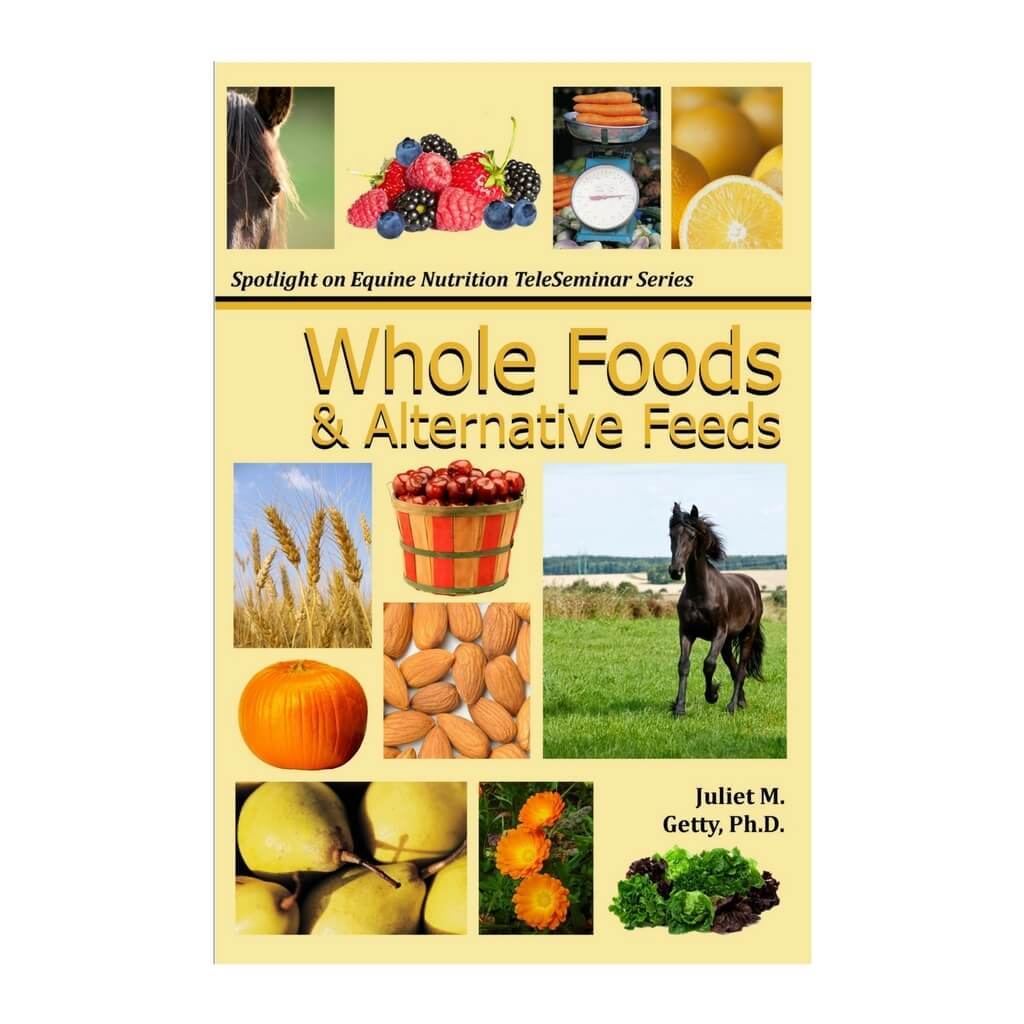-
Variety is not simply the spice of life for a horse; it's the key to his good health. In this transcribed and edited teleseminar, Dr. Getty discusses the many benefits of adding whole foods -- from berries to nuts -- to round out the horse's diet for optimal health.
Highlights:
- Grass, the perfect whole food
- Incredible treats
- Foods to avoid
- Making your own meals
- Foods for certain health problems
- Understanding omegas
About Dr. Juliet M. Getty
Juliet M. Getty, Ph.D. is an independent equine nutritionist with a wide U.S. and international following. Her research-based approach optimizes equine health by aligning physiology and instincts with correct feeding and nutrition practices. Dr. Getty’s goal is to empower the horseperson with the knowledge to provide the best nutrition for his or her horse’s needs.
Dr. Getty is the author of the comprehensive resource, Feed Your Horse Like a Horse, as well as seven topic-centered Spotlight on Equine Nutrition series of booklets:
- Whole Foods & Alternative Feeds
- Joint Health - A Nutritional Perspective
- Aging Horse - Help Your Horse Grow Old with Dignity and in Health
- Laminitis - A Scientific and Realistic Approach
- Easy Keeper - Making it Easy to Keep Him Healthy
- Equine Cushing's Disease - Nutritional Management
- Equine Digestion - It's Decidedly Different
Save on Book Packages!
- Save $2 when you buy any 2 Spotlight Titles (mix & match)
- Save $12 when you buy all 7 Spotlight Titles
- Save $28 when you buy all 7 Spotlight Titles + Feed Your Horse Like A Horse
Books can only be shipped with the U.S. So sorry, international orders can no longer be accepted. Books are available on amazon in paperback and Kindle versions.
She also offers an informative e-newsletter, Forage for Thought. Opt-In here. Her Resource Library offers a world of useful information for the horseperson, including a library of her past articles, tips and recordings. Her Free-Shipping Store helps horse owners choose the right supplement for their horse’s specific needs.
-
Excerpt from Whole Foods and Alternative Feeds
Foods to Avoid
First let’s talk about things to avoid. You want to avoid anything that belongs to the nightshade family. This would be tomatoes or peppers (sweet peppers or hot peppers) and raw white potatoes (cooked are okay). Also, I think it’s good to avoid feeding cruciferous vegetables such as broccoli, cabbage, cauliflower, kale, and Brussels sprouts; they’re not really toxic but they can produce excessive amounts of gas which can bring on a gas colic. I’ve heard of people giving a small amount of broccoli but I would not feed it in any kind of quantity.
Avoid things that are high in sugar. I wouldn’t feed sugar cubes or peppermints. Oh, I suppose if you give your horse a peppermint once in a while, it’s not going to harm him, but it’s certainly not contributing to his health. If you’re going to feed him something extra, make it count nutritionally.
The good stuff, not in any particular order.
Some general notes to start:
1. Remember, whenever you’re feeding fruits and vegetables, it’s good to cut them up into pieces that are longer than they are wide. The horse can chew them better, so they don’t get stuck in the back teeth.
2. Some people will soak the fruit or vegetable, especially if they’re going to feed the skins, in a diluted vinegar solution overnight. This has the advantage of removing any pesticides, bacteria or fungicidal residues that are on the outside of the skin. I don’t see any problem with this.
3. Some caution is in order when feeding fruit to the insulin resistant horse. In my Resource Library, under Whole Foods, you'll find an article entitled “Fruits for the Insulin-Resistant Horse.” In it, I list a lot of different fruits and their grams of sugars and how fruit can be safely incorporated into the diet for an insulin-resistant horse.
Edible Incredible Treats
Beets, and the greens of beets, are wonderful. Bananas, oh my, horses love bananas, and you don’t even have to peel them. In fact, banana peels are a good low-sugar way to add the taste of banana to your horse’s diet if he’s insulin resistant and can’t eat the actual fruit (the banana itself is pretty high in sugar). Celery, sweet potatoes, squash and pumpkin. Lettuce, even dark leafy lettuce, if your horse will eat it. Those old standbys, carrots and apples. Plantains, green beans, these are all wonderful. Unshelled peas are also very nice.
Dates are good, but remove the pit. I had a client who had a date tree and her horse loved it, too much, I might say; we had to remove that from his diet to some extent because he was overweight and at risk of experiencing laminitis. Raisins and grapes are also beneficial. Then there are the berries; every kind of berry—blueberries, raspberries, boysenberries, blackberries, strawberries—is excellent. Tropical fruits like mango and papaya, but make sure you remove the pit. Cranberries, cherries, but again, remove the pit. Citrus fruits like oranges, orange rinds and lemon rinds, grapefruits rinds, these are nice. I have yet to see a horse that doesn’t like watermelon—very cooling and a source of water. The watermelon rinds can be cut up into small pieces and offered as a low sugar treat. Pomegranates can be cut up, peel and all, and pureed in a blender for a very sweet treat.
Sunflowers seeds (but see my caution later about omega 6s), pumpkin seeds, certainly flax seeds (although they should be ground because they’re so small). Peanuts are also good but they should be roasted to kill the aflatoxins (a type of mycotoxin) they naturally contain—no salt added, please, since you are likely offering salt from another source.
Don’t forget herbs and flowers. Rose hips are very high in vitamin C. Parsley and marigolds are also very tasty for horses. And you can even feed freeze-dried fruits and herbs, which are more nutritious than most processed foods.
Have you ever made tea for your horse? Last summer, when I went out to visit my recently arrived horses, I had a glass of iced tea in my hand, and my horse started to drink it. After that happened a couple of times, I made up a big bowl of iced tea for him and his companion, and they just loved it. Avoid anything that’s caffeinated, though; I don’t think caffeine is a good idea for horses. But peppermint tea, chamomile tea, any kind of herbal tea would be wonderful for horses. I noticed the chamomile tea did make my horses a little sleepy.
Vitamin C has other roles, too. It’s an anti-inflammatory, it’s an antioxidant, and it’s also a natural antihistamine, which can be helpful for respiratory problems and even skin allergies.




